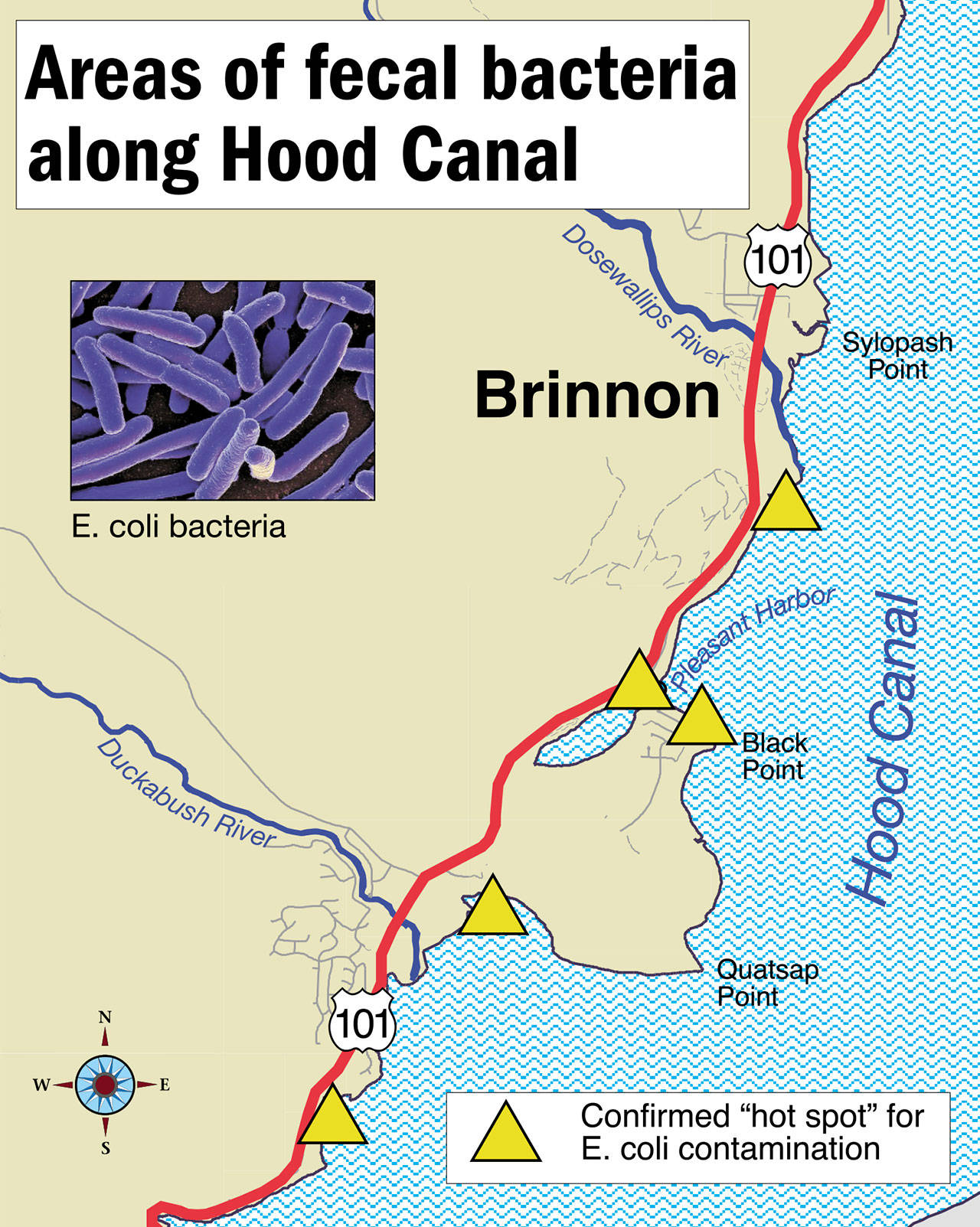HOOD CANAL — Commercial shellfish beds in the Duckabush estuary will remain closed for the summer after a third year of shoreline water quality monitoring found two forms of fecal bacteria.
Jefferson County Environmental Public Health monitored for Escherichia coli (E. coli) during the winter season, and the state Department of Health continued monthly monitoring for Enterococcus bacteria in the nearshore marine waters.
Both are associated with the feces of warm-blooded animals, according to the county health department.
The shellfish beds will be closed through Oct. 31.
“It’s going to be approved in the winter, but during the dry season, which is when we’re seeing the bacteria levels go up, the water quality goes down,” said Anna Bachmann, an environmental health specialist in the county’s water quality program.
The affected beds are in the Hood Canal 3 shellfish growing area from the Dosewallips River to the Triton Cove.
Commercial operations with licenses through June 30 in Hood Canal 3 include Minterbrook Oyster Company, Babare Brothers Shellfish Farms LLC, Taylor Shellfish Company Inc., Carbajal Oyster and Clams Farm, Gold Coast Oyster LLC, J&G Gunstone Clams Inc., Sea Fresh Farms Inc., Sunset Beach Oyster Company LLC, Calm Cove Shellfish Company and D.D. Denotta LLC, according to the state Department of Health.
All of those commercial operations also have licenses for other growing areas.
Bachmann said the state Department of Natural Resources likely will close the recreational shellfish beds for the season, too.
“That was the case last summer, and it’s the case this summer, too,” she said.
Bachmann has been studying the area for the past three years, the funding for which was provided by a Centennial Clean Water Fund grant from the state Department of Ecology. She’s found seals, elk, birds and pigs at fault, but said that humans are playing a larger role.
The county found six locations with high levels of bacteria in 2017-18 and two additional locations it deemed to be “hot spots,” where samples were three times more contaminated.
Both of those locations were off Rhododendron Lane on Black Point and were dry during the 2018-19 winter sampling season.
Last summer, two new hot spots were found in the Duckabush estuary and just south of the Olympic Canal Tracts development.
In the most recent winter sampling, the county found eight locations with high levels of bacteria and one hot spot, which was located just south of the mouth of the Dosewallips River.
“Other basins haven’t been seeing this,” Bachmann said. “This is the first time we’ve ever closed the Duckabush.”
When the county first surveyed the area from 2013-15, Bachmann said she had 90 cases with violations. They ranged from unpermitted outhouses to small developments that aren’t large enough to have a septic system installed, she said.
“Plots are too small for conventional septic systems,” Bachmann said. “They need a minimum of an acre in these areas. We’re trying to find ways to address this situation, but it’s really challenging.”
Fecal samples have been linked to humans both in the nearshore and upstream stations, she said.
“We have people who think, ‘Well, these are only camping properties so it doesn’t really matter,’ ” Bachmann said. “Well, it does.”
The highest hits have been registered following holiday seasons, she said.
Bachmann said she has been bringing the issue before the county Board of Health, which may look to put in place an emergency fix outside of its code, such as allowing holding tanks.
“We got some funding, and we’re winding up this summer to do cost-sharing with homeowners who don’t have the financial wherewithal for septic installation,” Bachmann said.
That expense can be about $35,000, she said.
“We’re going to focus on places we know are a water-quality threat,” Bachmann said.
________
Jefferson County Managing Editor Brian McLean can be reached at 360-385-2335, ext. 6, or at bmclean@peninsuladailynews.com.

